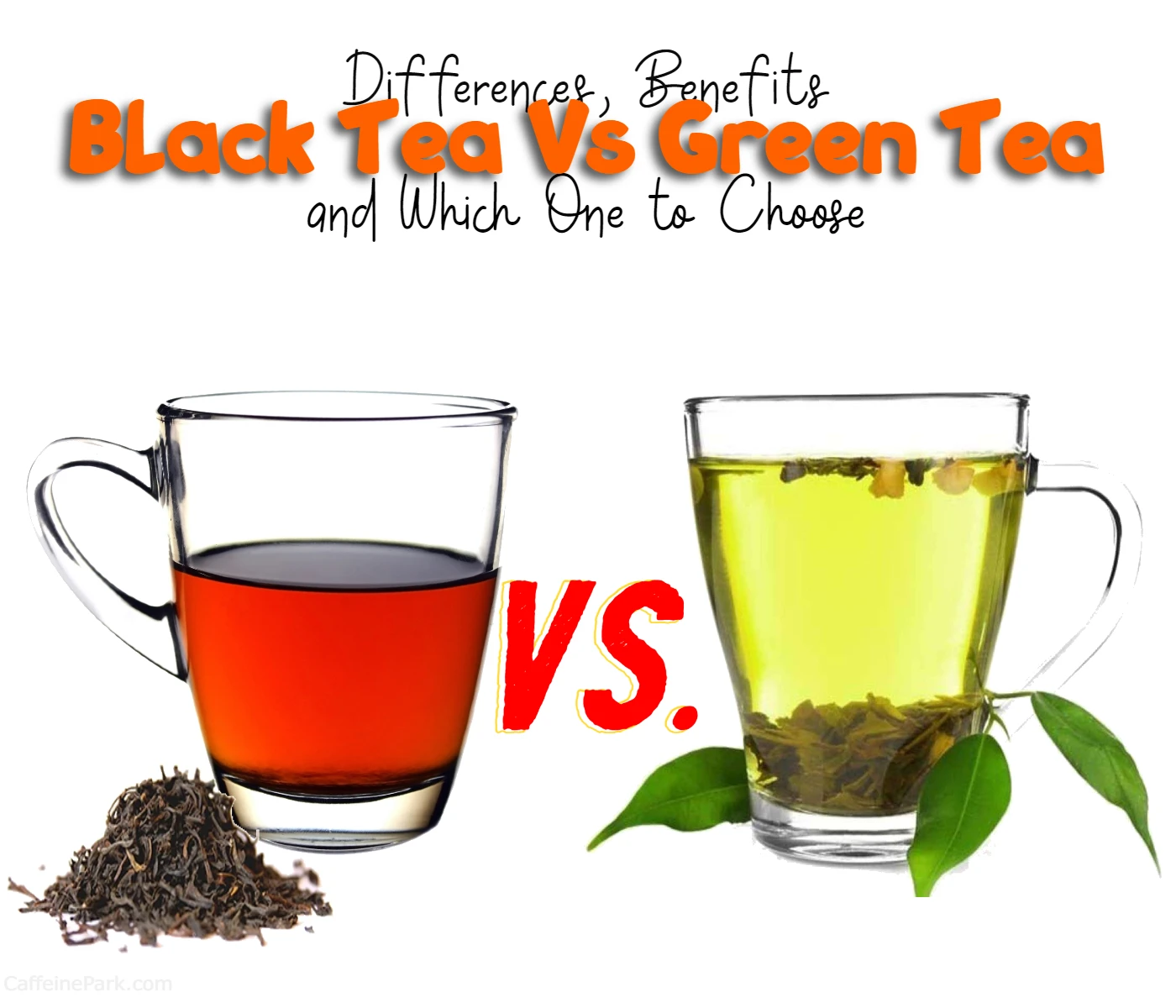Black Tea Vs Green Tea

Are you a tea lover wondering which type of tea to add to your daily routine? Look no further! In this blog post, we’ll be discussing the differences between black tea and green tea, and helping you decide which one is right for you.
Both black tea and green tea come from the same plant, Camellia sinensis, but they are processed differently, resulting in distinct flavors and health benefits. Black tea is fully fermented, while green tea is unfermented. This difference in processing also affects the caffeine content and antioxidant levels in the two types of tea.
So whether you’re a fan of bold, robust flavors or light, refreshing ones, we’ve got you covered. Keep reading to learn more about the benefits of black tea and green tea, how to brew the perfect cup, and which one you should choose based on your preferences and health goals. So read to the end of my blog to find out which type of tea is right for you!
Here is a quick chart comparing black tea and green tea:
| Black Tea | Green Tea | |
|---|---|---|
| Flavor | Bold, robust | Light, fresh |
| Caffeine content | Higher | Lower |
| Antioxidant levels | Lower | Higher |
| Processing method | Fully fermented | Unfermented |
| Health benefits | May improve heart health and gut health | May improve brain function and lower risk of chronic diseases |
| Recommended steeping time | 3-5 minutes | 1-3 minutes |
| Best enjoyed | With milk and sugar | Plain or with a slice of lemon |
| Popular varieties | Assam, Darjeeling, Earl Grey | Sencha, Matcha, Jasmine |
Keep in mind that these are generalizations and the specific flavor, caffeine content, and antioxidant levels of a particular tea can vary depending on factors such as the growing region and harvesting method.
Differences between black tea and green tea
If you’re a tea lover, you’ve probably wondered which is better for you: black tea or green tea? Both of these popular teas have their own unique flavor and health benefits, but how do they compare to each other? In this article, we’ll take a closer look at the differences between black tea and green tea, and help you decide which one is right for you.

What is Black Tea?
Black tea is made from the leaves of the Camellia sinensis plant, which is native to China and India. The leaves are withered, rolled, and fermented before they are dried, which gives black tea its characteristic dark color and rich flavor. Types of Black tea is typically stronger and more bitter than green tea, and is often enjoyed with milk and sugar.
What is Green Tea?
Green tea is also made from the leaves of the Camellia sinensis plant, but it is processed differently than black tea. The leaves are withered and steamed or pan-fried, which prevents fermentation and preserves their natural green color and fresh taste. Green tea has a lighter flavor than black tea, and is often enjoyed without milk or sugar.

Black Tea vs Green Tea: Flavor and Taste
One of the biggest differences between black tea and green tea is their flavor and taste. Black tea has a bold, strong flavor that is often described as malty or smoky. It is typically served with milk and sugar to balance out the bitterness. Green tea, on the other hand, has a fresh, grassy flavor that is slightly astringent. It is often enjoyed without milk or sugar, and is sometimes flavored with herbs or fruit to add a subtle sweetness.
Black Tea vs Green Tea: Caffeine Content
Another difference between black tea and green tea is their caffeine content. Black tea typically contains more caffeine than green tea, with about 40-60 milligrams per cup. Green tea, on the other hand, contains about 25-29 milligrams of caffeine per cup. If you’re sensitive to caffeine or trying to cut back, green tea may be a better choice for you.
Black Tea vs Green Tea: Antioxidants
Both black tea and green tea are rich in antioxidants, which help protect your cells from damage caused by free radicals. However, green tea contains more of a specific type of antioxidant called catechins, which have been shown to have powerful health benefits. One study found that drinking green tea daily for 12 weeks reduced markers of oxidative stress and inflammation in people with metabolic syndrome.
Black Tea vs Green Tea: Health Benefits
Health Benefits of Black Tea:
- May Improve Heart Health: Black tea contains flavonoids, which are antioxidants that may help improve heart health by reducing the risk of heart disease.
- May Improve Gut Health: Some studies have found that black tea may help improve gut health by promoting the growth of beneficial gut bacteria and reducing inflammation in the gut.
- May Lower Risk of Type 2 Diabetes: Drinking black tea has been associated with a lower risk of type 2 diabetes, potentially due to its ability to improve insulin sensitivity and reduce inflammation.
- May Improve Focus and Alertness: Black tea contains caffeine, which can help improve focus and alertness.
Health Benefits of Green Tea:
- May Lower Risk of Chronic Diseases: Green tea contains catechins, which are antioxidants that may help reduce the risk of chronic diseases such as cancer, heart disease, and Alzheimer’s disease.
- May Improve Brain Function: The caffeine and L-theanine in green tea may help improve brain function and mood.
- May Aid in Weight Loss: Green tea may help aid in weight loss by increasing metabolism and fat burning.
- May Lower Risk of Type 2 Diabetes: Drinking green tea has been associated with a lower risk of type 2 diabetes, potentially due to its ability to improve insulin sensitivity and reduce inflammation.
It’s important to note that these potential health benefits are not guaranteed, and more research is needed to fully understand the effects of black tea and green tea on health. Additionally, adding excessive amounts of sugar or milk to tea can negate some of the potential health benefits. As with any dietary change, it’s best to consult with a healthcare professional before making significant changes to your diet.
Both black tea and green tea have been linked to a range of health benefits, thanks to their high antioxidant content. However, some studies suggest that green tea may be slightly more beneficial than black tea in certain areas. For example, a study of over 40,000 Japanese adults found that drinking green tea daily was associated with a lower risk of death from all causes, including cardiovascular disease and cancer, while black tea was not associated with a significant reduction in risk.
On the other hand, black tea has been shown to have a positive impact on gut health. One study found that drinking black tea daily for four weeks increased levels of beneficial gut bacteria and reduced inflammation in people with type 2 diabetes.
Which One is Right for You?
When it comes down to it, the choice between black tea and green tea is largely a matter of personal preference. If you enjoy bold, strong flavors and are looking for a caffeine boost, black tea may be the better choice for you. If you prefer lighter, fresher flavors and want to enjoy the health benefits of tea without the caffeine jitters, green tea may be the way to go.
That being said, both black tea and green tea have a place in a healthy diet. They are both low in calories and high in antioxidants, and can be enjoyed hot or cold throughout the day. If you’re looking for a way to boost your overall health and well-being, incorporating tea into your daily routine is a great place to start.
How to Brew the Perfect Cup of Black Tea
If you’re new to black tea, here are some tips for brewing the perfect cup:
- Choose high-quality tea leaves. Look for loose leaf tea rather than tea bags, as loose leaf tea is often of higher quality and will give you a better flavor.
- Use fresh, cold water. Bring the water to a boil, and then let it cool for a minute or two before pouring it over the tea leaves.
- Steep the tea for 3-5 minutes. The longer you steep the tea, the stronger and more bitter it will be. Experiment with different steeping times to find the perfect balance for your taste.
- Add milk and sugar if desired. While some tea connoisseurs prefer their tea black, many people enjoy adding a splash of milk and a bit of sugar to their black tea to balance out the bitterness.
How to Brew the Perfect Cup of Green Tea
If you’re new to green tea, here are some tips for brewing the perfect cup:
- Choose high-quality tea leaves. Look for loose leaf tea rather than tea bags, as loose leaf tea is often of higher quality and will give you a better flavor.
- Use fresh, cold water. Bring the water to a boil, and then let it cool for a minute or two before pouring it over the tea leaves.
- Steep the tea for 1-3 minutes. Green tea can quickly become bitter if it is over-steeped, so be sure to keep an eye on the time.
- Enjoy plain or add a slice of lemon. Green tea has a delicate flavor that can be enjoyed on its own, or with a slice of lemon to add a subtle citrusy note.
Conclusion
In conclusion, both black tea and green tea offer unique flavors and health benefits. Whether you prefer the bold taste of black tea or the delicate flavor of green tea, incorporating tea into your daily routine is a great way to boost your overall health and well-being. So go ahead and brew yourself a cup of your favorite tea, sit back, and enjoy!
FAQs
Both black tea and green tea offer health benefits. Black tea may improve heart health and gut health, while green tea may improve brain function and lower the risk of chronic diseases. Ultimately, the best tea for you depends on your personal preferences and health goals.
Yes, black tea typically has more caffeine than green tea. However, the specific caffeine content can vary depending on factors such as the growing region and harvesting method.
Both black tea and green tea are generally safe to consume in moderate amounts. However, drinking excessive amounts of tea (more than 5 cups per day) can lead to side effects such as headaches, dizziness, and nausea due to the caffeine content.
While some people enjoy adding milk and sugar to green tea, it’s not typically recommended as it can mask the delicate flavor of the tea. If you prefer your tea with milk and sugar, black tea is a better option as it has a stronger flavor that can hold up to these additions.
Loose leaf tea is often considered of higher quality than tea bags, as it is typically made from larger, whole tea leaves that can offer a more complex flavor. Additionally, tea bags can contain lower quality tea dust and fannings. However, there are some high-quality tea bags available on the market as well.
Read More:
Source:
- https://www.healthline.com/nutrition/top-10-evidence-based-health-benefits-of-green-tea
- https://www.mayoclinic.org/healthy-lifestyle/nutrition-and-healthy-eating/in-depth/caffeine/art-20049372
- https://www.health.harvard.edu/heart-health/brewing-evidence-for-teas-heart-benefits
- https://www.health.harvard.edu/heart-health/black-tea-a-soothing-drink-for-good-health





